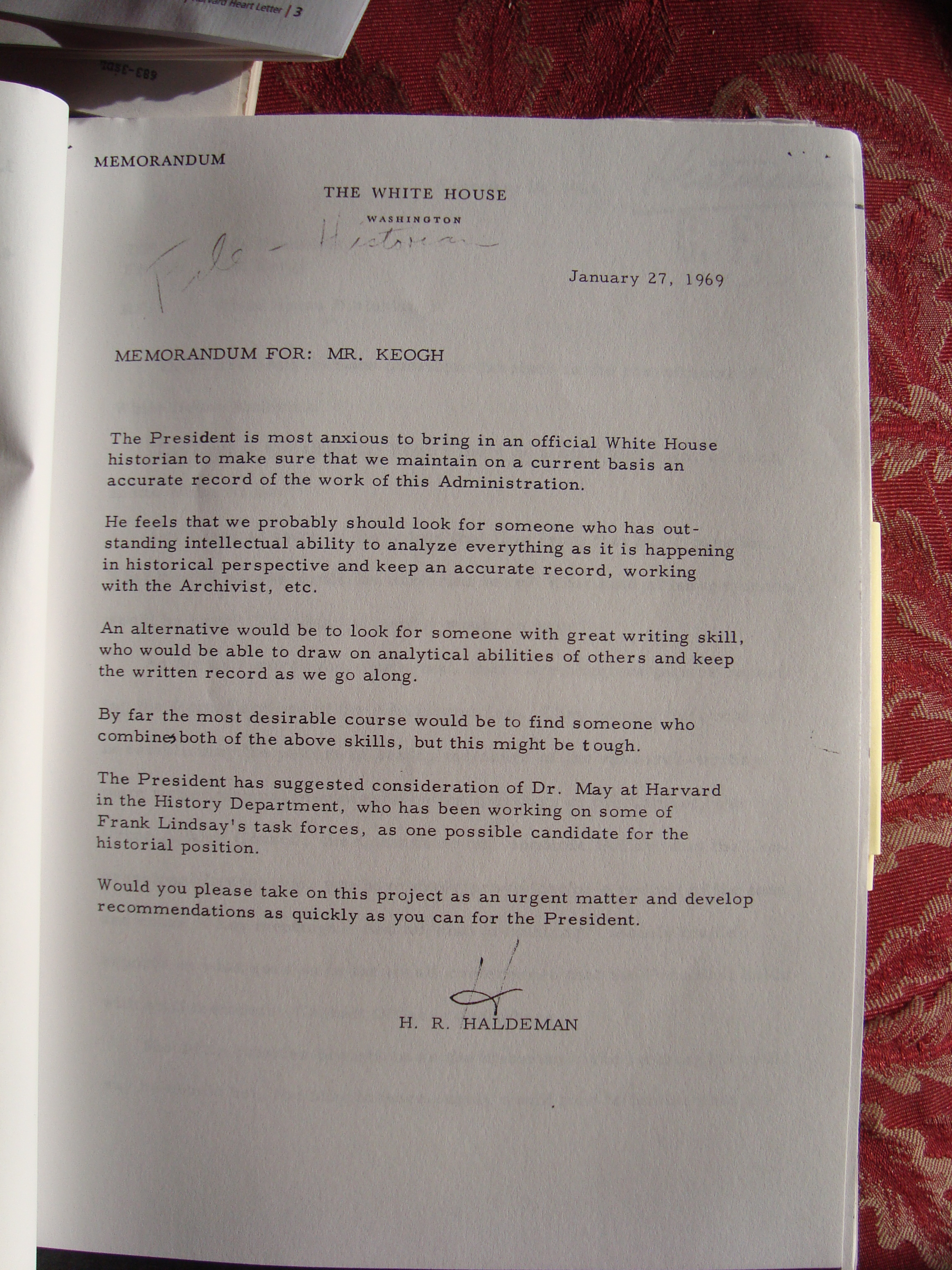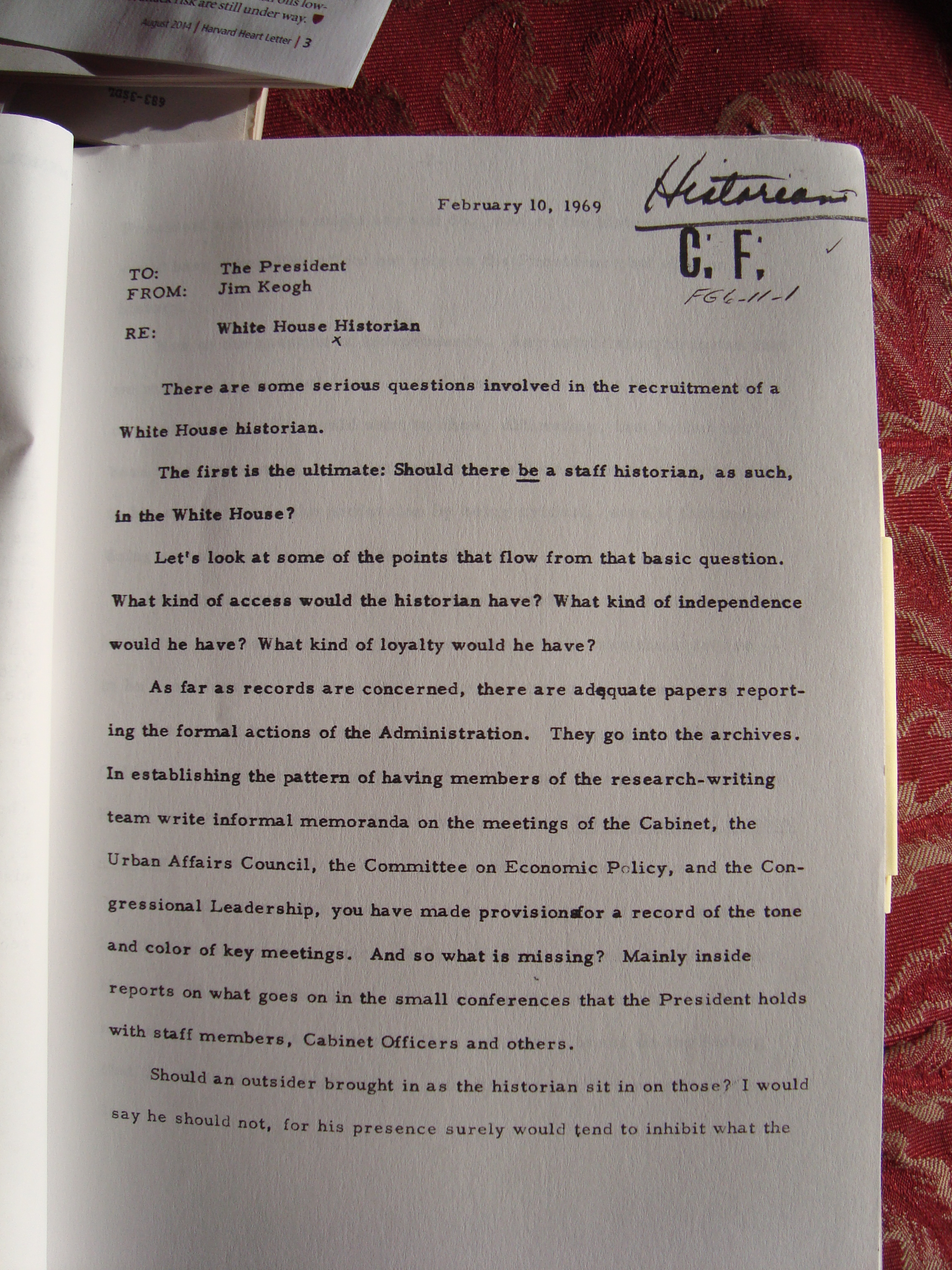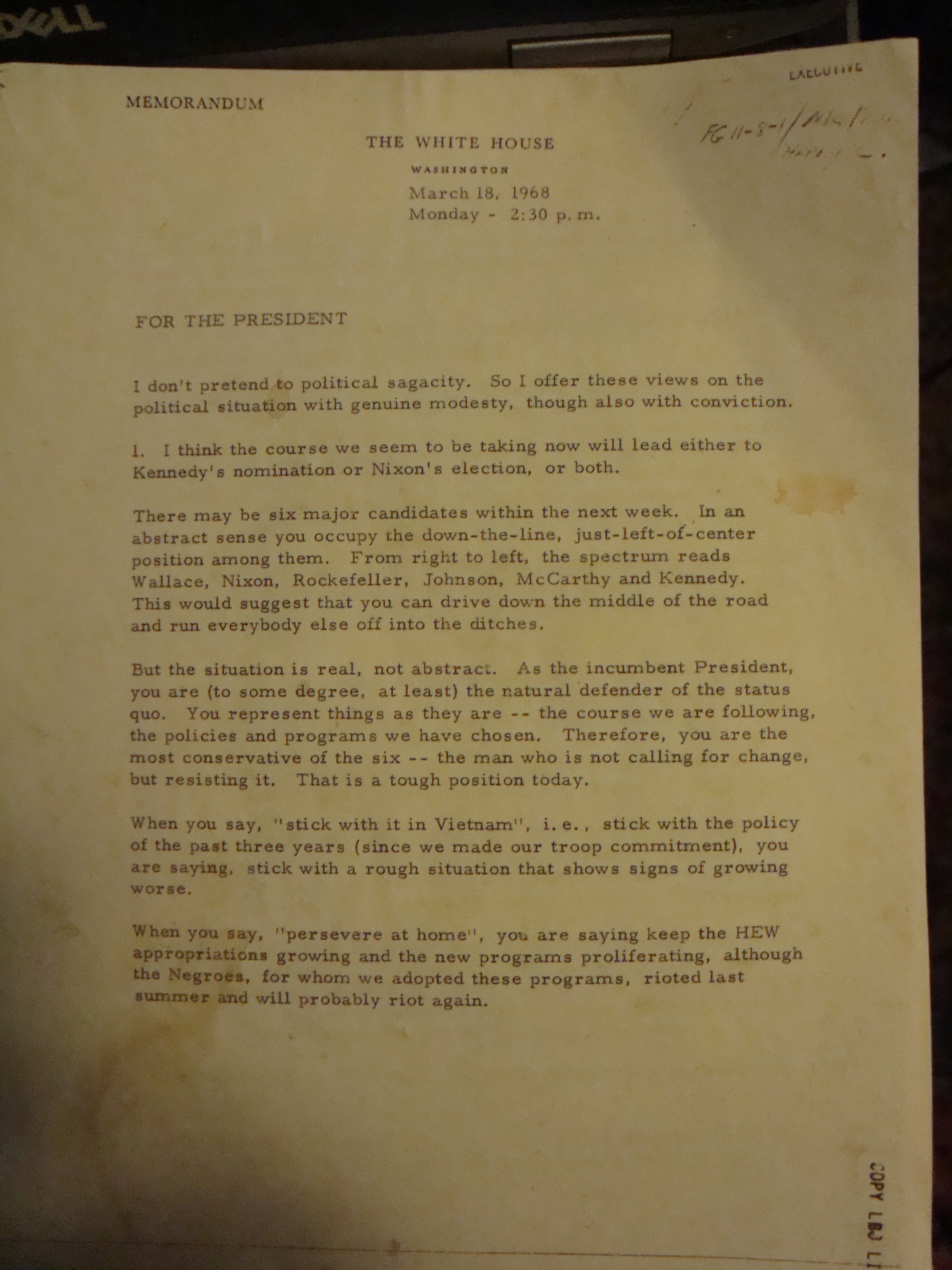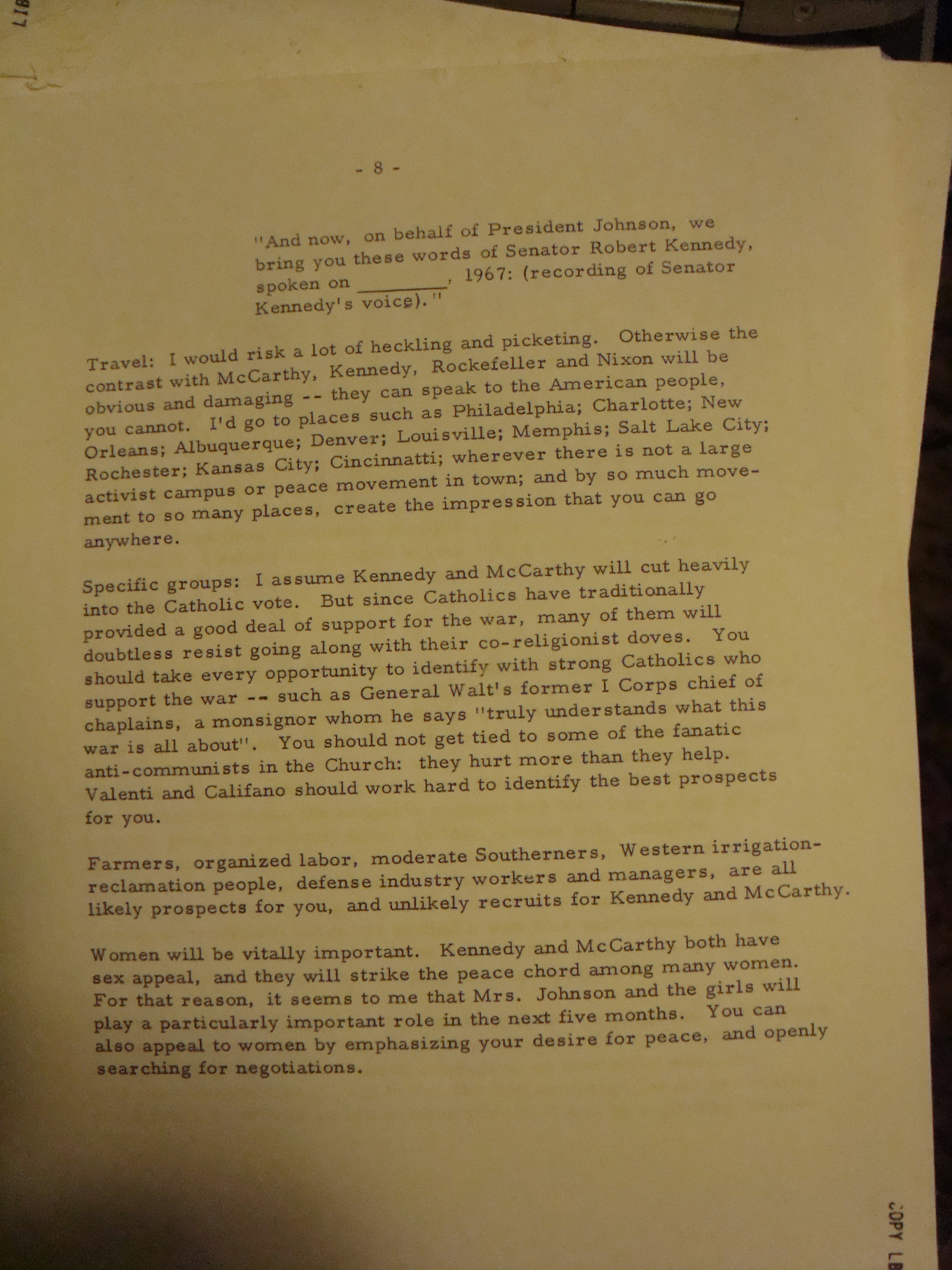On Jan. 27, 1969, less than a week into the Nixon presidency, Nixon’s chief of staff H. R. Haldeman relayed the following request from President Nixon to White House aide and former Time magazine executive editor James Keogh: “The President is most anxious to bring in an official White House historian to make sure that we maintain on a current basis an accurate record of the work of this administration.” Nixon even had a person in mind for the position: Professor Ernest May, a historian at Harvard University who had served on the Lindsay transition task force. More generally, Nixon sought someone “who has outstanding intellectual ability to analyze everything as it is happening in historical perspective and keep an accurate record… .” Here is the full memo from Haldeman to Keogh.

On February 10, evidently after canvassing various White House aides regarding Nixon’s proposal, Keogh responded with a four-page memo to the President that began, “There are some serious questions involved in the recruitment of a White House historian. The first is the ultimate: Should there be a staff historian, as such, in the White House?” Would the President want an outsider sitting in during key meetings? Keogh’s answer, shown here at the bottom of the first page of his memo, was: “I would say he should not, for his presence surely would tend to inhibit what the President and others might say and do. And so the historian’s presence could have a negative effect not only on the Presidency but also on history.”
In addition to inhibiting conversation, Keogh warned that “any established historian that we might bring on would have very definite ideas about his own freedom of point of view.” That might mean a desire to prove “his credentials to his colleagues in the profession by being critical even if that meant doing so only for the sake of being critical.” Keogh also warned that “Loyalty is another problem” – someone who initially expressed support for the President might, over time and in reaction to events, change his views.
In seekng a “court historian” Nixon may have had in mind some counterpart to Arthur Schlesinger, Jr., the Harvard historian who served on JFK’s White House staff, and who used his position to write A Thousand Days: John F. Kennedy in the White House, a not uncritical but generally quite positive account of JFK’s presidency. But Keogh had other examples in mind, telling Nixon: “The recent track record on all this is not encouraging. Eric Goldman, professor of history at Princeton, was brought into the White House by Lyndon Johnson. He has just produced the Tragedy of Lyndon Johnson, which can only be described as an anti-Johnson book.”
Keogh noted that he had discussed Nixon’s request with his immediate team of White House aides: “The consensus in this group is that this Administration should not bring in a historian as such. This position is based on the feeling that the risks are too high and the potential for positive results too low.” Rather than a court historian, Keogh suggested instead that aides be assigned to keep detailed notes of meetings, “recording the color, the tone, the asides for the general Administration record.” For more intimate conferences with the President “I see only one process. The people involved should as often as possible record their own impressions… .This also suggests that the President himself should, as often as possible, dictate his own thoughts and impressions… on tape or on paper…and on some kind of more or less regular schedule.”
We now know, of course, that Nixon did Keogh one better. In 1971, so as to provide a more accurate history of his administration’s proceedings, he had a secret taping system installed in the Oval Office, the Old Executive Office Building, the Cabinet Room and at Camp David. Conversations were recorded via this voice-activated system for more than two years, starting on February 16, 1971 through July 18, 1973. It was these tapes, particularly this so-called “smoking gun” tape dating from June 23, 1972, that provided clear proof that Nixon obstructed justice by trying to impede the investigation into the Watergate break in.
[youtube.com/watch?v=_oe3OgU8W0s]
When a unanimous Supreme Court ruled 8-0 that Nixon must hand over the tapes to an independent prosecutor, and the transcripts of the tapes were made public, Nixon lost any hope of surviving the Watergate scandal. Forty years ago today, he officially resigned the presidency. It is tempting, of course, to surmise that if only Nixon had appointed a court historian, he might not have also seen the need to install a taping system. But that is probably not the case. From the moment they take office, all presidents, and their immediate advisers, are aware that they are making history and they understandably want to insure an accurate record of the events in which they participate. But meeting notes can only go so far toward providing that record. For this reason Franklin Roosevelt, Kennedy and Johnson all secretly recorded some White House conversations. Kennedy did so despite the presence of Schlesinger, Jr., as his White House “court historian”.
But these previous recording systems differed from Nixon’s in one key respect: they had to be manually activated by the President. This meant that they were forced to exercise a bit more discretion than Nixon did when deciding what to record for posterity. Had Nixon been forced to activate his recording devices, he might never have decided to essentially tape himself admitting to crimes. But in his memoirs Nixon defends the decision to install a voice activated machine: “I thought that recording only selected conversations would completely undercut the purpose of having the taping system; if our tapes were going to be an objective record of my presidency, they could not have such an obviously self-serving bias. I did not want to have to calculate whom or what or when I would tape.” Alas for the future of his presidency, Nixon was initially “conscious of the taping, but before long I accepted it as part of the surroundings.”
“From the very beginning,” Nixon writes in his memoirs, “I had decided that my administration would be the best chronicled in history.” Little did he know how prescient that statement was. No subsequent president has, to my knowledge, kept any recording system in their White House, and for good reason. And, with the advent of e-mail, even the paper documentary trail is a less reliable history of a president’s time in office (although there are safeguards in place that are intended to preserve electronic messages as part of an administration’s presidential records). Had Nixon been less conscious of the need to accurately record the events of presidency, he might have emulated his predecessors and utilized a manually-activated recording device. But he did not.
For want of a switch, he lost the presidency.




